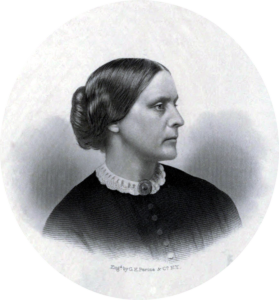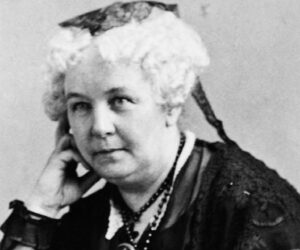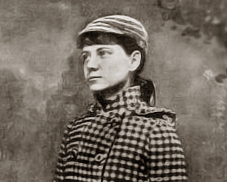
SUSAN B. ANTHONY – “IN HER OWN WORDS”
Enjoy a few words selected from Susan B. Anthony’s February 2, 1896, interview with Nellie Bly for The World, a New York newspaper. Hear her voice while reading her words. The headings have been added.
Early Years. I was born in South Adams, Massachusetts. My mother and my father were born in the same town. My father was a Quaker and my mother was a Methodist. There were four girls and two boys in the family. My father believed in the equality of his daughters, even in those days.
I was named Susan after my father’s sister and after my grandmother on my mother’s side. My grandmother’s name was Susannah, but they never put “ah” on me. When I was a young woman there came a great craze for middle initials. We girls scratched our heads to find one. The aunt who named me afterwards married a man named Brownell, and I decided to take her initials for mine. So, you see, I named
myself. And I am always glad I did. There might be a thousand Susan Anthonys, but the B. makes it distinctive.
Suffrage Seed Planted: I think the first seed for thought was planted during my early days as a teacher. I saw the injustice of paying stupid men double and triple women’s wages for teaching merely because they were men. In 1848 I came home at the end of my school term to visit my family. Mrs. Stanton and Mrs. Mott had just been in Rochester, and my family could talk of nothing else. I remember the first time I ever heard of suffragists I was bored and complained because my family were so intensely interested in the subject. “Can’t you find anything else to talk about,” I said to my sisters in disgust. I didn’t understand suffrage, but I knew I wanted equal wages with men teachers. However, I had no idea between voting and equality. I went back to my school and forgot all about it.
In 1849 I heard Abbie Kelly Foster, the Quaker Abolitionist, and I read the reports of a great convention that gave me the first clear statement of the underlying principles of woman suffrage. The next year I went to an abolition meeting at Seneca Falls, where I met Mrs. Stanton, who was head of the Daughters of Temperance society. As I was a schoolma’am, I was asked to make a speech. I’ve got the yellow manuscript now of that speech. There was nothing to it. I never could think of points, and I can’t write a speech out. I must have an audience to inspire me. When I am before a house filled with people I can speak but to save my life I couldn’t write a speech.
myself. And I am always glad I did. There might be a thousand Susan Anthonys, but the B. makes it distinctive.
Many people will tell you [smiling] that from their earliest days they cherished the ideas that eventually became their life work. I won’t. As a little girl my highest ideal was to be a Quaker minister. I wanted to be inspired by God to speak in church. That was my highest ambition.
Commitment to Equality. The secret of all my work is that when there is something to do, I do it. I rolled up a mammoth temperance petition of 28,000 names and it was presented to the Legislature. When it came up for discussion one man made an eloquent speech against it, stating “and who are these who signed the petition? Nothing but women and children.” Then I said to myself, why shouldn’t women’s names be as powerful as men’s? They would be if women had the power to vote. Then that man wouldn’t have been so eloquent against temperance, for he would have known that the women would vote his head off. I vowed there and then women should be equal. Women could not respect themselves or get men to respect them as equal until they had the power to vote.
Support. My family were my strong supporters when I first started out. I don’t think I could ever have done my public work if I had had opposition at home. My youngest sister, who taught school twenty-six consecutive years, superintended everything I wore and I was relieved of every home responsibility.
Marriage. True marriage, the real marriage of soul, when two people take each other on terms of perfect equality, without the desire of one to control the other, to make the other subservient, it is a beautiful thing. It is the truest and highest state of life.
Spreading the Word. For the last thirty years I have writt
en in all albums, ‘Perfect equality of rights for women, civil or political.’ There is another, one of Charles Sumner’s, ‘Equal rights for all.’ I never write sentimental things. There isn’t much sentiment in me. Neither can I read poetry. I cannot make it jingle. I suspect that is also due to my lack of musical ability.
Bicycles. Let me tell you what I think of bicycling [leaning forward and laying her hand on Miss Bly’s arm] I think it has done more to emancipate women than anything else in the world. I stand and rejoice every time I see a woman ride by on a wheel. It gives woman a feeling of freedom and self-reliance. It makes her feel as if she were independent. The moment she takes her seat she knows she can’t get into harm unless she gets off her bicycle, and away she goes, the picture of free, untrammeled womanhood.

Elizabeth Cady Stanton
When asked who is the greatest woman of our age, her response was Elizabeth Cady Stanton. She is a philosopher, a statesman, and a prophet. She is wonderfully gifted – more gifted than any person I ever knew, man or woman – and had she possessed the privileges of a man her fame would have been world-wide and she would have been the greatest person of her time.
Progress. I want to add one thing. Once men were afraid of women with ideas and a desire to vote. To-day our best suffragists are sought in marriage by the best class of men.
Appearance and characteristics [words of Miss Nellie Bly]
· Susan Brownell Anthony was born on the 15th of February, 1820. She is 5 feet 5 inches tall and weighs 155 pounds. She is very well-formed, splendidly so for an elderly woman, and she is so solid that she gives one the impression of being rather slender.
· She has an abundance of jewelry given to her by admiring friends, but she wears very little. She always carries a gold watch, and it is fastened to her with a gold chain and a strong pin in the form of a dagger stuck through a crown.
· She wears one ring. It is a plain narrow wedding ring and was given to her by her friend, Dr. Clemence Lozier, when she was thought to be upon her death-bed. Miss Anthony promised to wear the ring always and she has done so.
· In disposition Miss Anthony is very lovable. She is always good-natured and sunny tempered. Everybody loves her dearly and she never loses a friend. She has a remarkable memory and in speaking is both eloquent and witty. She keeps an audience laughing during an entire evening.
· Miss Anthony enjoys a good joke and can tell one. She never fails to see the funny side of things though it be at her own expense.
· Susan Anthony is all that is best and noblest in woman. She is ideal, and if we will have in women who vote what we have in her, let us all help to promote the cause of woman suffrage.

Nellie Bly
Source: https://davidblixtauthor.medium.com/champion-of-her-sex-nellie-bly-interviews-susan-b-anthony-a8111b2a5e7
